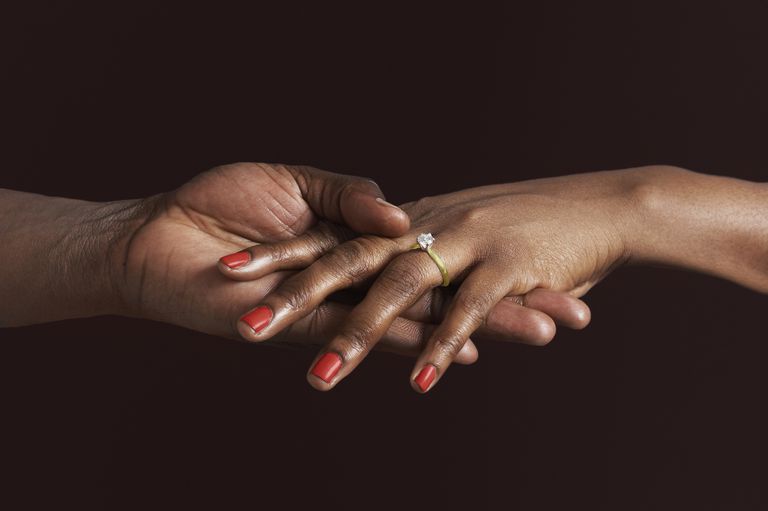Hypergamy V. Hypogamy: Black women and ‘dating up’ or ‘dating down’


Gold digger, ‘kept woman,’ and all of the other terms used to describe women who “date up” has become a hot topic with a fancy name — hypergamy — and the debates are causing those unfamiliar with the “new” practice (that’s, frankly, been around for ages) Googling the lingo before joining the conversations.

If you’ve been surfing the Internet this past year, you’ve probably ran into the topics of ‘Hypergamy’ v. ‘Hypogamy’ and ‘Femininity’ at least once.
You may be wondering, “WTH is hypergamy and what is the big deal about being ‘feminine’?”
This question in and of itself has been found problematic in understanding the Hypergamy Movement.
What is hypergamy?
According to the Webster dictionary,
“The action of marrying or forming a sexual relationship with a person of a superior sociological or educational background.”
This movement and its re-discovery has been very popular among African American women in recent times.
Many influencers, including an anonymous YouTuber ‘Chloe_’, who has generated over 14.7 thousand followers on Instagram and over 77.5 subscribers on YouTube, creates videos surrounding the topics of hypergamy and self-care, specifically for Black women.
Chloe’s advice also appears to spawn debate that Black women have neglected themselves for years for the ultimate title of the ‘Independent woman’ and ‘I don’t need no man,’ categories.
There are tons of Influencers who also share the same sentiments, urging their audience to live a hypergamous lifestyle, opposite of choosing hypogamy, which – on the flip side – is the definition of dating or marrying below your own social or economic status. To give an example, it’s like the Corporate woman dating the Blue-Collar man.
In defense of hypergamy, it is no wonder why Black women are choosing a different route than the ones of their mothers and grandmothers.
According to many studies, findings by race reveal that Black and Latina mothers are more likely to be breadwinners than white mothers. Furthermore, a substantial 84.4 percent of Black mothers were primary, sole, or co-breadwinners in their households in 2017.
In other words, most households amongst these racial groups are led by single mothers.
This is a stark difference from white households where 62.4 percent of white women are the breadwinners.
In addition, according to statistics, only 1 in 4 Black women will marry a “quality” husband. While the stats for their white counterparts either being married or will be married to a quality husband are doubled.
So how did Black women get the short end of the stick?
Many studies have shown the implications of not having a male figure in the household under the union of marriage.
Children are much more likely to be poor if they live in a family headed by a single mother than if they live in a two-parent household. In 2017, 41 percent of children living in single-mother families were poor, compared with 8 percent of children living with a married couple.
Not to mention, the health implications of women ‘doing it all’ has adversely impacted their heart and psychological health.
Having to endure raising a child alone while remaining on the constant ‘grind’, it’s no wonder this new generation is choosing a different path.
Look at the health statistics when it comes to heart disease, stress and anxiety, which have increased in American women ever since they fought to be treated equally on the workforce.
These numbers are double with African American women.
A recent study came out during the pandemic revealing nearly 2.2 million women have now left the workforce.
The study also revealed that women (of all races) discovered having more mental peace, now being able to spend more time with their families and having more control over their lives due to being home more.
This is not a new concept, considering women were primarily homemakers prior to the Women’s Movement and Feminist Movement.
This is not to saying women are choosing not to work. There has actually been an uptick in female entrepreneurs as many have started their own home-based businesses.
Many have also discovered the importance of marriage and its purpose, after expressing the ‘fear’ of being alone during and after the pandemic. It was as if a ‘realization’ came about that ‘two’ is better than ‘one.’
In an infamous show called ‘Black AF’, Rashida Jones’ character, Joya Barris – a bi-racial black woman – goes on a tangent explaining to her publicist, played by Nia Long, the frustrations of being a Black woman in America.
She particularly says something that many viewers weren’t expecting, considering her character is married in the show.
“We’ve always had to take care of everyone but ourselves. We’ve always had to be pragmatic even when we’re dreaming, it’s f*** exhausting,” Jones said.
She continued, “For white women, the idea of being a kept woman has been around since the beginning of time. But don’t let it happen with us. We get lucky enough to marry someone who wants to take care of us and it’s ‘oh my God, it’s a Black woman someone wants to love and take care of us, give us a camera. Next thing you know there’s like 17 TV shows about it.”
The frustration this character is expressing has been expressed in circles of Black women for years and it points out the hypocrisy that it’s okay for non-Black women to “marry up” and have a provider while a Black woman is called a ‘gold digger’ at best for wanting the same.
